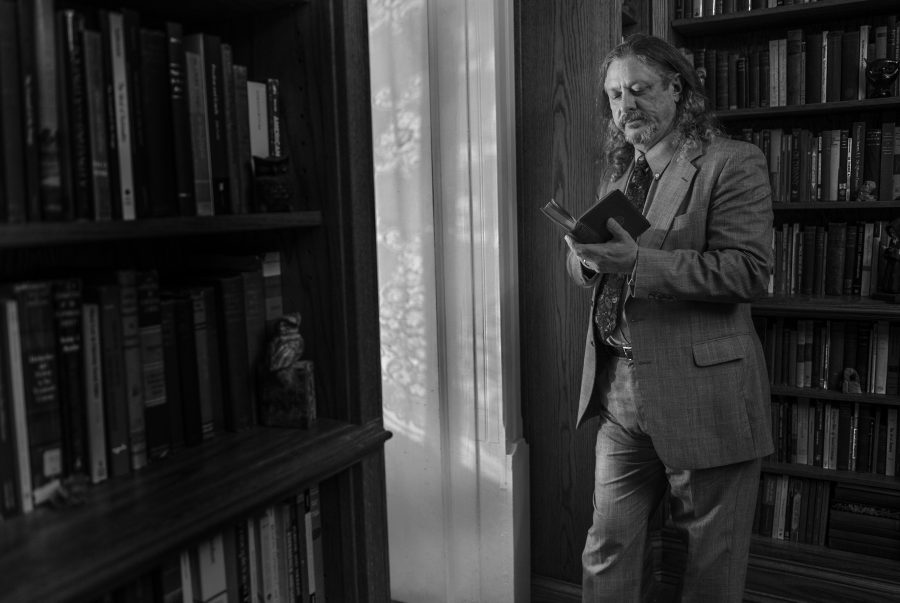SIU philosophy professor opens research library in his home
Professor of philosophy Randall Auxier poses for a portrait Monday, Nov. 21, 2016, in his Murphysboro home prior to its opening ceremony as the American Institute for Philosophical and Cultural Thought. The institute, which houses an estimated 35,000 books and scholarly articles, was established as a research site for humanities students in response to the closure of SIU’s Center for Dewey Studies. “It didn’t look anything like this when we moved in,” Auxier said. “It’s taken a lot of work.” (Ryan Michalesko | @photosbylesko)
November 23, 2016
Area scholars celebrated the opening of a new research site Tuesday evening in the Murphysboro home of an SIU philosophy professor, a measure liberal arts enthusiasts hope will revitalize and embolden the study of the humanities in the region.
Randall Auxier, a 17-year professor of philosophy at the university, led group tours through his Victorian home, stopping at intervals to share the history behind artwork and sculptures crafted by southern Illinois artisans. It is now dubbed the American Institute for Philosophical and Cultural Thought, the result of a research initiative conceptualized by Auxier and longtime colleague John Shook two years ago in response to the ramping down of SIU’s Center of Dewey Studies.
More than 35,000 books and published papers were collected from various donors to be used for research by scholars from around the world. Bookcases reach from floor to ceiling. Canvass paintings cover the walls. Sculptures and antique furniture line the living spaces. Even some of the interior design is created by local artisans, from bathroom tiles to the grand staircase in the home’s great room.
Advertisement
“It didn’t look anything like this when we moved in,” Auxier said of the home he and his wife, Gaye, bought 15 years ago. “It’s taken a lot of work.”
In addition to providing a workspace for visiting scholars, Auxier aims to put the house on the National Register of Historic Places, an official list of properties maintained by the federal government deemed preservation-worthy for their historical significance.
Before the opening ceremony, Auxier said he long suspected his house was the intended destination of the institute when he and Shook set out to buy a cheap house without luck. After no alternatives presented themselves, the question finally came: Couldn’t they just have it at Auxier’s house?
“Turning the place into the institute seemed like a logical thing to do,” Auxier said.
With much help and a lot of books from Shook, the professors decided to set up shop in Murphysboro. Aside from providing the materials, Shook said the home is also meant to serve as a sort of “bed and breakfast” for as many researchers as the Auxiers can host.
“We felt terrible that American and international students wouldn’t really have a base anywhere,” said Shook, the president of the institute and a professor of humanities at Bowie State University in Maryland. “We didn’t want southern Illinois to vanish from the intellectual map. It was a unique place. It was a nerve center.”
But it’s only getting started. Shook estimates the overall capacity of the newly-founded library at around 70,000 books.
Advertisement*
A world-renowned research space with rare collections by American philosopher John Dewey, the Center for Dewey Studies was once a beacon for international scholars. The collections it houses are now kept under lock and key in the basement of Morris Library, Shook said, where access is more limited than it once was.
Shook calls it a “symptom of the general decline” of institutional support for the humanities, but they are determined to provide that education — even if it has to take place off campus.
“This is a place for people to study what America means,” Shook said. “That’s why we’re going to continue to be an international resource.”
Meera Komarraju, dean of the College of Liberal Arts, said part-time positions at the Center for Dewey Studies will be eliminated after the end of the year, but its materials will continue to be available in the basement of Morris Library for students and visitors. It is set to operate, if in a lesser capacity, under the guide of interim Director Tom Alexander though Spring 2017.
“This is not a surprise,” Komarraju said of the reduced funding for the Center. “This is something that has been expected for some years because state support has been dwindling.”
Recent cuts to university research and employment are the result of lowered state funding and the Illinois budget impasse. Public universities have since July operated with a temporary stopgap spending plan, which expires in December, but funding for the rest of the fiscal year remains uncertain until the Legislature passes a full budget.
In response to disinvestment from the state, Komarraju said cuts to services in the College of Liberal Arts have been spread across the board.
“As a new dean, these are some of the difficult things I’ve had to do,” she said.
As the state suffers from immediate problems that stem from mismanagement perpetuated by legislative leaders, Auxier said the newly-founded institute is meant to provide a space where study of the humanities can persist despite what he calls a corporatization of education across the country.
“It’s not just here,” he said. “It’s everywhere.”
Part of the mission of its founders is to digitize the rare materials within the library, a project Auxier expects to continue through his lifetime. He also said the institute will be open for students of the humanities through appointments, but also expects to expand the resident fellowship program.
The institute accepted its first fellow, Thurman Willison from Union Theological Seminary in New York, who is staying at the institute as he works to complete his dissertation on American philosophy.
Larry Hickman, a professor emeritus and former director of the Center for Dewey Studies, signed on to be part of the creation about a year ago following a 23-year tenure at the university. Hickman said he witnessed an “enormous revival” of pragmatism around the world as satellite affiliate research institutions opened in Brazil, Spain, France, Germany, Poland and Switzerland.
“People have come from all over the world to visit the Dewey Center,” Hickman said. “It may very well be that this institute may take that role on.”
Campus editor Bill Lukitsch can be reached at blukitsch@dailyegyptian.com or on Twitter @lukitsbill.
To stay up to date with all your SIU news, follow the Daily Egyptian on Facebook and Twitter.
Advertisement








